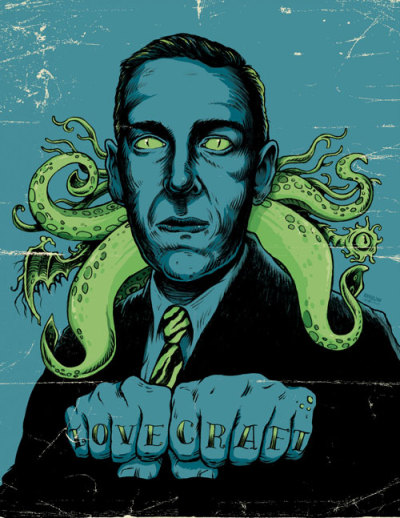 |
| http://pinkymcfatfat.tumblr.com/post/1357234795 |
I began to encounter H. P. Lovecraft in other places. Having remembered the name H. P. Lovecraft, it made me smile when Vinge makes a reference to him in Rainbows End when talking about one of the belief circles in the library. It seems that maybe Lovecraft had enough influence to get remembered in Vinge's novel set around 2025. So, after reading Ben's post and remembering my brother and his girlfriend, I decided to check him out on wikipedia. Going down the page I learned for the first time that H.P. Lovecraft is a person and not a sub-genre of horror like I had originally thought. I was also amused to see that Lovecraft was quite fond of the idea of Forbidden Knowledge, a figure popular in one of the belief circles of Vinge's Rainbows End. Lovecraft has also inspired a lot of music, movies and literature with his horror and strange fiction. Learning these connections was kind of fun for me, but I doubt that I will ever get around to reading his work. And that is OK.
What is the point of studying English in college anyway? Can I consider it an education if I've never read H. P. Lovecraft or Lord of the Flies or any Steinbeck? Of course I can. The way I see it, English isn't about who can read the most books. It's about communication and art. We learn better communication by learning to write and express ourselves and also learning to analyze and understand what others are trying to say through their own writings. We learn the art of language by appreciating and studying what makes literature artistic and what aesthetic value it has to offer. Then, those that are especially good, can combine the two aspects and create something themselves that is both well communicated and artistic. That is how I view my college education.
What do you think? Should I try to read everything? Can we call ourselves English majors or lovers of literature if we haven't read everything on the official canon of literature? What is the point of the study of language? Leave me some of your comments. I'd love to see what you think.
p.s. I've tagged some Lovecraft info in my diigo account. Check that out on the right if you want to know more about him.
I was led to your post because you posted in diigo. I went to the wiki article first and was like ... what does this have to do with our class? Then the other archive and saw the "popular culture" tab and the "belief circles" that have literally sprung up around this guy. But I love the connections you make in your post.
ReplyDeleteAs for reading the entire cannon, I think it is helpful in understanding (like you found with Forbidden Knowledge and HP Lovecraft and Vinge's Rainbow's End) future authors work that is intertextual with the cannon to have a thorough understanding of as much literature from the cannon as you can. At the same time, there are arguments about whether we should even have a cannon and how non-universally representative it is. I can understand both arguments. For myself I try to find a healthy balance. I'll read what I can (even after my english major is over) and try not to be partial to the English cannon but read a variety of works.
I bet we can find a LOT more on the discussion of "what we should read" out there on the web.
Mentioned your post in mine for today: http://brizabriskacademic.blogspot.com/2011/05/must-reads.html#more
ReplyDeleteI think that is a really good point. You can't read everything. Sometimes I feel guilty because there is so much classic literature out there that I have not read. But you can't read it all. Being an English major doesn't mean that you are an expert on every major author their works. If we are learning the skills or analysis and communication then we are successful because then we can apply those skills when we do get around to reading those books that people claim are 'must reads'.
ReplyDelete"What is the point of studying English in college anyway? Can I consider it an education if I've never read H. P. Lovecraft or Lord of the Flies or any Steinbeck? Of course I can. The way I see it, English isn't about who can read the most books. It's about communication and art. We learn better communication by learning to write and express ourselves and also learning to analyze and understand what others are trying to say through their own writings. We learn the art of language by appreciating and studying what makes literature artistic and what aesthetic value it has to offer. Then, those that are especially good, can combine the two aspects and create something themselves that is both well communicated and artistic. That is how I view my college education."
ReplyDeleteReally liked this paragraph. For me the study of English is about critical analysis, about learning to analyze, dissect, expand your mind and horizons, not so much about being able to say you've read every Jon Donne poem.
Please never read Lord of the Flies. I beg you. Continue on in your innocence.
ReplyDelete